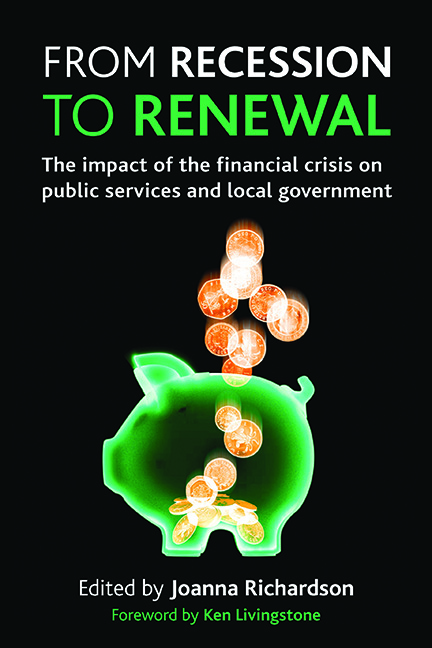 From Recession to Renewal
From Recession to Renewal nine - Governing the mix: how local government still matters
Published online by Cambridge University Press: 01 September 2022
Summary
Introduction
The recession and subsequent public spending squeeze have focused attention on how local government will respond to predicted increases in levels of need among local communities while at the same time working within reduced budgets. The Conservative–Liberal Democrat Coalition government's determination to implement £6 billion of efficiency savings in its first year in office indicates an intensification of the pursuit of ‘efficiency gains’ within local government and across local public services that was begun under the previous Labour administration. In this context the coalition's initial agreement published on 11 May 2010 to ‘promote the radical devolution of power and greater financial autonomy to local government and community groups … [including] a full review of local government finance’ (Conservatives and Liberal Democrats, 2010) could prove to be a double-edged sword – longsought-after autonomy accompanied by very limited room for local manoeuvre, given the financial constraints. Even prior to the 2010 general election, local councils were reporting the likelihood of redundancies among staff. The post-election announcements about public spending suggest that these initial redundancies will not be the last. While local government policy has been devolved to the different governments of the UK and so is outwith the direction of the coalition, the pressure on public spending will have a significant impact on how those administrations review the possibilities for local government.
Amid the speculation about how bad the immediate future will be for local government and local services, two arguments have come to define the terms of the debate. Both are underpinned by an emphasis on efficiency, though they are often articulated slightly differently. The first argument focuses on extending the role of the market in local service provision. At a minimum this involves local councils applying market disciplines to determine where they can benefit from ‘sharing services’. While this may sound appealing in principle, the reported ‘collapse’ of shared services plans among local councils, such as in South East Wales, illustrates how tricky these relationships can be (Western Mail, 9 March 2010). Beyond that, local councils are encouraged to make greater use of a range of existing instruments, including ‘outsourcing’ or ‘partnership working’ with commercial or third sector providers to deliver services to localities more efficiently.
- Type
- Chapter
- Information
- From Recession to RenewalThe Impact of the Financial Crisis on Public Services and Local Government, pp. 179 - 196Publisher: Bristol University PressPrint publication year: 2010


